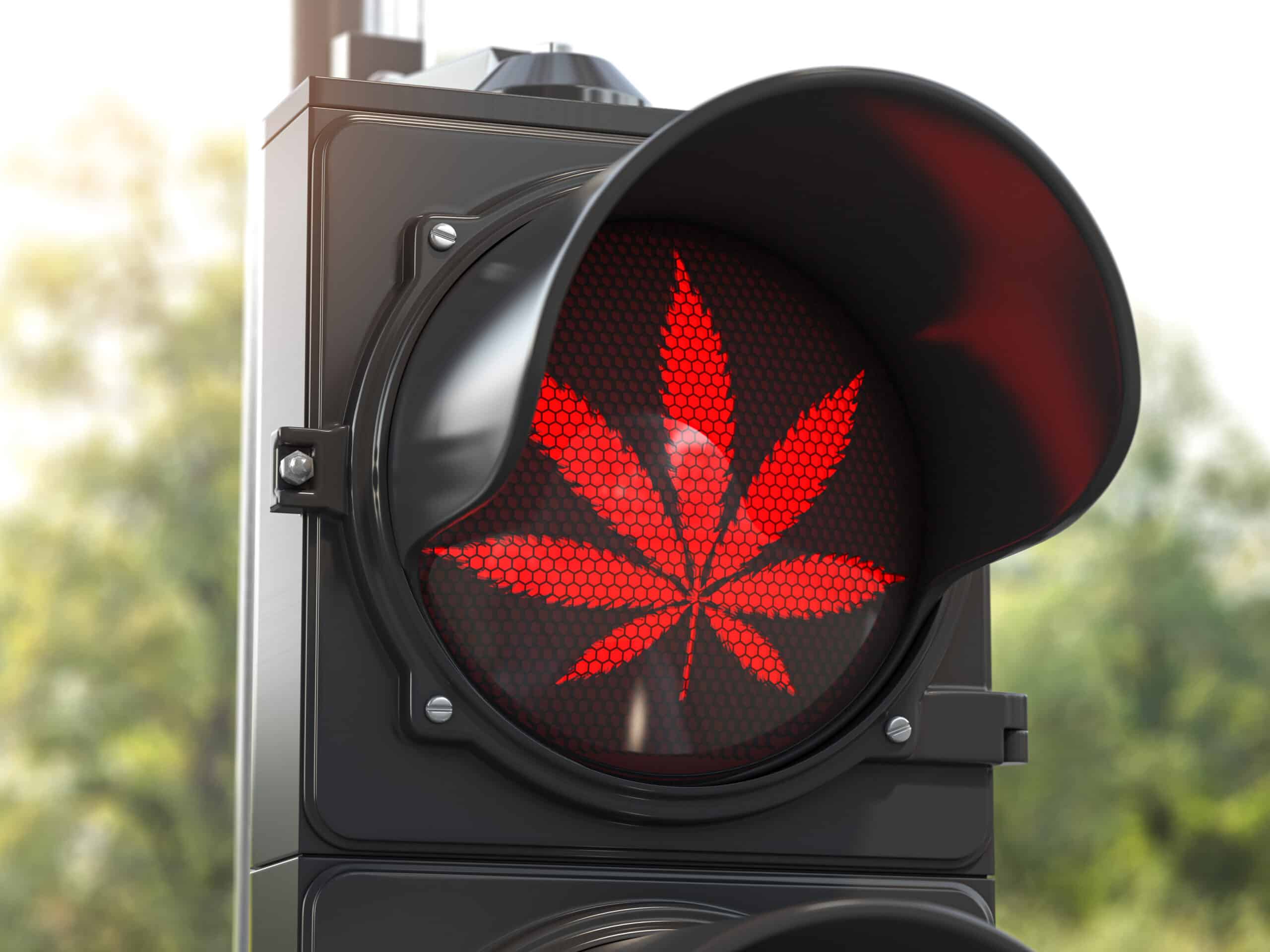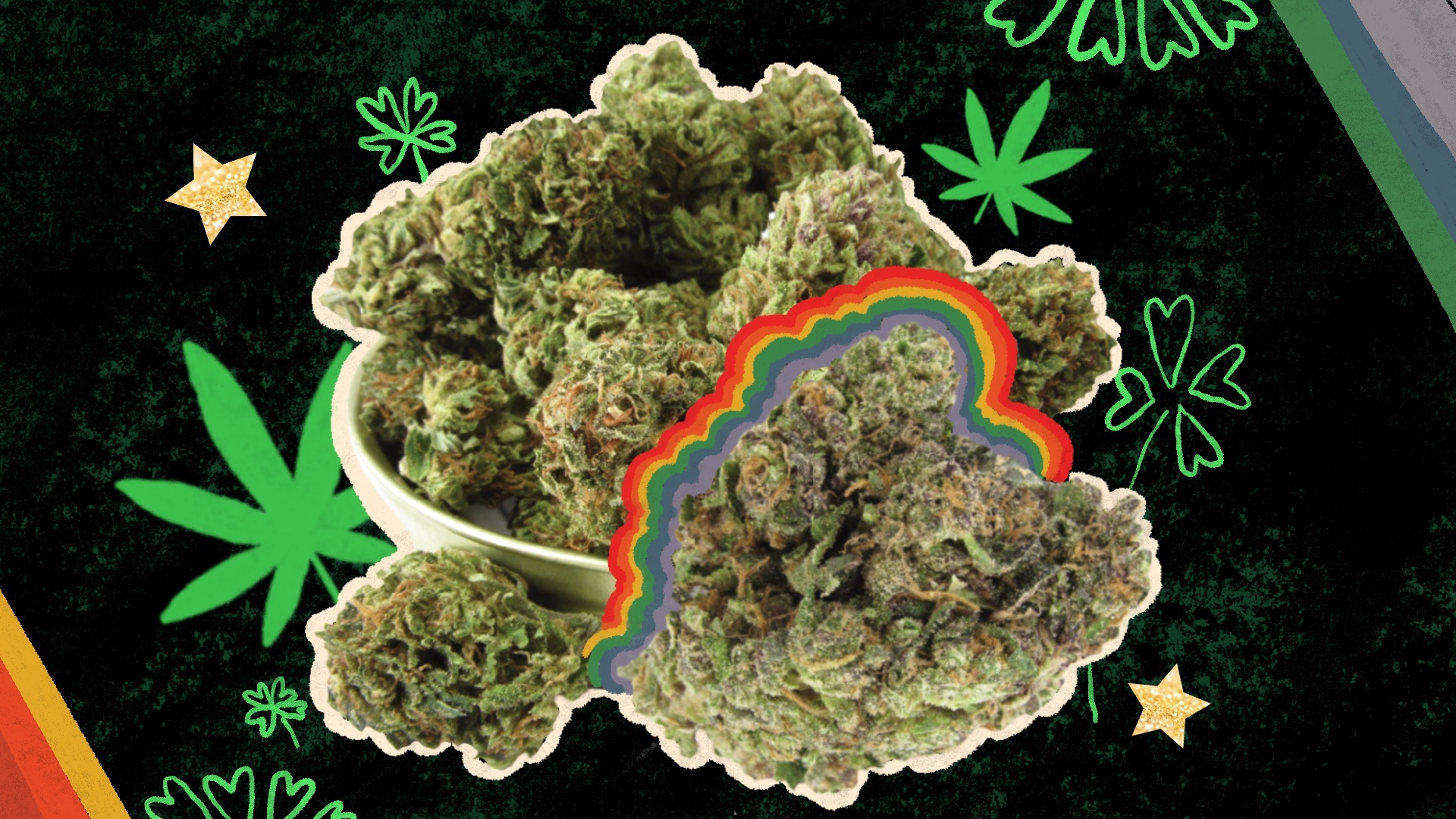Bye-bye, Dry January.
Millions of weed smokers say adios to winter’s worst with a breathtaking selection of lucky green across the USA and Canada this St. Patrick’s Day.
Legalization in over 20 states offers ever more affordable alternatives to booze. The California outdoor is perfectly cured. Your favorite musician has a new strain. Maryland has Cookies brand Cinnamon Milk. Even Texas has THCA Pink Certz.
This hand-picked selection includes fresh flowers, rosin chocolates, and infused ‘dogwalkers’—small joints perfect for party-hopping. Just make sure you go easy if you’re cross-fading.
Related
How to order weed delivery online with Leafly
California St. Patrick’s Day strains and edibles picks
Original Glue by various, including by Down Om Farms
It’s rare to encounter extremely potent cannabis with a faceted, enjoyable high that doesn’t transform you into a zombie halfway through the blunt.
This real, original cut of GG4 (Gorilla Glue #4) grown in living soil by Down Om Farms (available through Farm Cut) is a perfect flower. The potency is rivaled only by the deeply relaxing and joyful experience of its high.
Heavy on the gas, cream, and chocolate, the nose alone is intoxicating. A single poof coats your mouth in a layer of syrupy terps. The first time I smoked it, I was so high I thought I had also eaten at some point.
Turns out, I had only snapped a single bowl, and this flower is that good.—Lindsay MaHarray
Point Breeze by Khalifa Kush

Wiz Khalifa adds a 5th strain to his Khalifa Kush lineup—Point Breeze. That’s Khalifa Kush x Gastro Pop for a potent mix of OG Kush fuel and grape gas. Wiz dropped it at Stiiizy March 7, and it’ll make its way across the US next. (CA, coming to AZ, NV, OR, MD, FL, PA, MA)
4 Directions by Emerald Spirit Botanicals

Four Directions from Mendocino’s Emerald Spirit Botanicals is yet another Farm Cut masterpiece—because real ones know flower should be untamed. A cross of Pink Boost Goddess (five-time CA State Fair Gold Medalist, 2024 Golden Bear winner) and Harmony Rose (Emerald Cup champ), this strain is a symphony of cannabinoids: THC, CBD, THCV, and CBDV wrapped in 4.2%+ terps. Myrcene brings lush berry sweetness, β-Ocimene adds a citrusy snap, and terpinolene laces in an herbaceous, floral funk. Sun-grown in well-tended soil, jarred fresh with the loosest of trims, Four Directions is as nature intended—pure, potent, and ridiculously flavorful.—Jackie Bryant
Wavvy by Wavves

Beach weather arrives in your ears and lungs with garage rocker Wavves of LA’s launch of Wavvy Supply Co. Wavves has “mini-donuts” containing hash, and Wavvy minis in dispensaries. Blast the new Wavves track “So Long” and make your winter cares a distant memory.
Zours by Hall of Flame
Fresh off Zalympix contest win for “Most Unique”—this mix of Z and Sour D is lighting up people’s senses then knocking them on their asses. This strain gained a lot of love in 2024 with the exotics crowd, and it would seem that Sweet and Sour weed is definitely on the menu for 2025. —Matt Jackson
See also: Fig Farms Duffy’s 14-gram smalls; Raw Garden’s new ‘Sprout’ all-in-one; Rove Ice Packs and Diamond Series vapes.
St. Patrick’s Day Affiliate partner pick

Recommended product
A staple of our St. Patrick’s Days, CANN’s delicately dosed 2 mg THC and 4 mg CBD really pairs well with picnics and garden parties. Skip the hangovers with this microdosed seltzer that’ll make the drunks less annoying. They use 100% agave nectar, fresh ginger, and high-quality THC and CBD distillate. One CANN equals a glass of wine, and it has just 35 calories. Available nationwide.
Arizona
Zpectrum by Alien Labs
Get this new RS-11 x Z #22 cross in Arizona and puff on the toughest stuff in the market. Shop Alien Labs in Arizona.
Sluggers infused prerolls + Curaleaf
California’s infused joint-maker, Hit Sluggers, are selling quickly in their new market of Arizona via a collaboration with Flow Distro and Curaleaf. Sluggers knock their potent joints out of the park with fire flower that is hand-trimmed, ground, packed, hand-painted with rosin, and hand-rolled in keef. These ‘dogwalker-sized’ joints test around 50% THC and come in artfully designed packaging with collectible cards. Shop Sluggers in Arizona.
Illinois
Garlic Butter by Revolution
Why only drink your green when you can also smoke it? This St. Patty’s Day, the Garlic Butter strain goes along with corned beef and mashed potatoes. This cross between GMO and Fortune Cookie is perfect for wanting to feel focused, uplifted, and happy! The smell is buttery, with a cheesy hint to complement the aroma. The buds are light green (leprechauns love it) and have subtle hints of orange hairs. Before sitting down for an Irish dinner or hitting the town, smoking your greens can bring the best luck with quality bud.—Hannah Vyosky
See also: Rythm Blue Zashimi; Northern Heights Strawberry Gary; DNA Genetics Sharksbreath 2.0
New York
Soft Power Sweets live rosin flower chocolate

Four-leaf clover? In New York, it’s more like 10 leaves. Soft Power Sweets’ new chocolate bars take the shape of flowers (or clovers, depending how you look at it). Each petal contains a single dose of live rosin-infused, vegan milk chocolate. For the marathon that is St. Patrick’s Day, we recommend the “Pick Me Up” sativa-based option. Each petal has 5 mg THC and 2.5 mg CBD in chocolate made with almond milk instead of animal products. Even if you don’t find the pot of gold, you can still feel like you’re over the rainbow. —Amelia Williams
Love Jones by Method Man’s TICAL

Finally, something resembling West Coast Weed. Method Man—an artist who needs no introduction. Love Jones—a symphonic harmony of White Runtz, Jet Fuel Gelato, Horchata, and Grape Gas #10. TICAL—an iconic album and now brand created by Method Man. TICAL in New York comes from ADK Hemp Co, who describe their growing facility as indoor, with help from the sun. Keep a tissue handy because Love Jones has stick, plus you’ll probably stick to the couch. It oozes those classic Runtz and Gelato terps, with a grape and cinnamon twist.—A.W.
See also: Gron 100mg THC Phantom Lychee Limeade Pearls
Canada
Quebec Gold
Almost mythical in its elusiveness, Quebec Gold is the blurry sasquatch photo of cannabis cultivars. Consequently, it’s often duped thanks to its legendary reputation and gold-standard genetics from Canada’s cannabis hall of fame, including M-39, the problem child of Northern Lights #5 and Skunk #1, and Freezeland, a canon legacy market favourite in northern Quebec. Quebec Gold is a sativa-leaning party strain with zero social anxiety. It’s lemon-heavy but has an exceptionally complex tropical flavour profile of pineapple, mango, and pine. Perfect for potheads partying with drunk friends, you can keep the conversations flowing and satisfy any dry mouth with whatever green drinks are on deck! —Amanda Breeze
Michigan
Quad-infused rolls by Jeeter

America’s top-selling infused joint brand, Jeeter, have introduced “quad” rolls this March—a joint with four layers of hash and flavor in it. Specifically, THCA liquid diamonds, terpenes, kief, and now rosin. The rosin adds a “smoother, more full-spectrum effect.” These things pack a punch at over 40% THC, so one puff can be enough. (Also in CA and AZ)
See also: Doja Pak Permanent Marker at King of Budz; Clout King Wagyu at JARS Cannabis
Here are a few more quick picks from six states.
Florida S. Patrick’s Day picks
Root Beer Sherb by GrowHealthy; a Florida exclusive.
Ridgeline LANTZ 90-micron hash from Cookies at Cookies Miami
Live Rosin X Bites Blackberry Lemon at Curaleaf Orlando
Maryland
Fade Co OZK at Nirvana Cannabis Baltimore
Cookies Cinnamon Milk at Greenlight Therapeutics
More brand Hash Burger at Ritual
Missouri

Vivid brand Pure Michigan at Releaf Resources
Local brand RS-11 at From the Earth
Royal Cannabis brand Glitter Bomb at Fresh Green
New Jersey
Rythm L’Orange at Treeotics dispensary
Niche brand Oishi III at URB’N Dispensary
Clade9 brand J1 at Zen Leaf
Texas
Texas is awash in THCA flower to enhance your St. Patty’s Day. Try out these picks.
Kache brand Papaya Cake at Kache
Texas Hill Country brand Italian Ice at Texas Hill Country
Greune Botanicals Pink Certz at Greune Botanicals
Colorado

Lastly, Green Dot Labs brand Final Boss (Cherry Pot Pie x F.A.F.O.). King of Green Dot’s gas-heavy lineages, including OG Kush, Chem, GMO, Sour Diesel, and Cherry Pie.
Rare Dankness Commerce City Kush at Social Cannabis
Wana Brand Fast Asleep Dream Berry at JARS Cannabis
And there are your St. Patrick’s Day picks. Get out there and make your own luck.






































